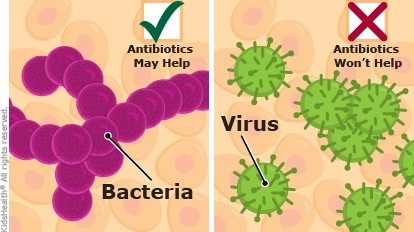ANTIBIOTICS OVERUSE IN CHILDREN

Every year, your family probably faces its share of colds, sore throats, and viruses. When you bring your child to the doctor for these illnesses, do you automatically expect a prescription for antibiotics?
Many parents do. And they’re surprised, maybe even angry, if they leave the doctor’s office empty- handed — after all, what parent doesn’t want their child to get well as quickly as possible? But your doctor could be doing you and your child a favor by not reaching for the prescription pad.
How antibiotics work :
To understand how antibiotics work, it helps to know about the two major types of germs that can make people sick: bacteria and viruses. Although certain bacteria and viruses cause diseases with similar symptoms, the ways these two organisms multiply and spread illness are different:· Bacteria are living organisms existing as single cells. Bacteria are everywhere, but most don’t cause any harm — and in some cases may be beneficial. Lactobacillus, for example, lives in the intestine and help digest food. But some bacteria are harmful and can cause illness by invading the human body, multiplying, and interfering with normal bodily processes. Antibiotics are effective against bacteria because they work to kill these living organisms by stopping their growth and reproduction.
· Viruses, on the other hand, are not alive and cannot exist on their own — they are particles containing genetic material wrapped in a protein coat. Viruses “live,” grow and reproduce only after they’ve invaded other living cells.Some viruses may be fought off by the body’s immune system before they cause illness, but others (colds, for example) must simply run their course. Viruses do not respond to antibiotics.
Taking antibiotics for colds and other viral illnesses not only won’t work, but also has a dangerous side effect: over time, this practice helps create bacteria that have become more of a challenge to kill. Frequent and inappropriate use of antibiotics can cause bacteria or other microbes to resist the effects of antibiotic treatment. This is called bacterial resistance or antibiotic resistance. Treating these resistant bacteria requires higher doses of medicine or stronger antibiotics. Because of antibiotic overuse, certain bacteria have become resistant to some of the most powerful antibiotics available today. Among those that are becoming harder to treat are pneumococcal infections (which cause pneumonia, ear infections, sinus infections and meningitis), skin infections and tuberculosis.
Ask your doctor about ways to treat the symptoms that are making your child uncomfortable, such as a stuffy nose or scratchy throat, without the use of antibiotics. The key to building a good relationship with your doctor is open communication, so work together toward that goal.
Help fight antibiotic resistance by taking simple steps to prevent the spread of infections. Encourage hand washing, make sure your kids are up to date on immunizations, and keep kids out of school when they’re sick.
Taking antibiotics safely:
So what should you do when your child gets sick? To minimize the risk of bacterial resistance, keep these tips in mind:- Treat only bacterial infections.Seek advice and ask questions. Letting milder illnesses (especially those thought to be caused by viruses) run their course to avoid the development of drug-resistant germs may be a good idea — but it’s still best to leave what constitutes a “mild illness” up to your doctor. Even if the symptoms don’t worsen but linger, take your child to the doctor. At the office, ask questions about whether your child’s illness is bacterial or viral, and discuss the risks and benefits of antibiotics. If it’s a virus, don’t pressure your doctor to prescribe antibiotics, but ask about ways to treat symptoms.
- Use antibiotics as prescribed.
- Don’t save antibiotics for next time.
- Never use another person’s prescription.
Ask your doctor about ways to treat the symptoms that are making your child uncomfortable, such as a stuffy nose or scratchy throat, without the use of antibiotics. The key to building a good relationship with your doctor is open communication, so work together toward that goal.
Help fight antibiotic resistance by taking simple steps to prevent the spread of infections. Encourage hand washing, make sure your kids are up to date on immunizations, and keep kids out of school when they’re sick.














0 Comments
Please do not enter any Spam Link in the comment box.